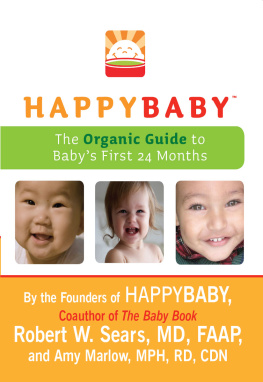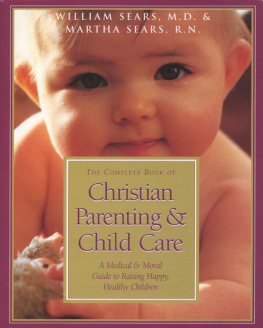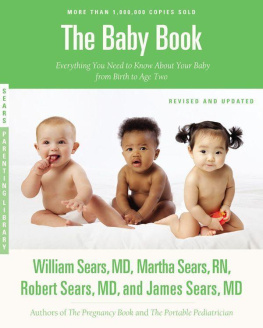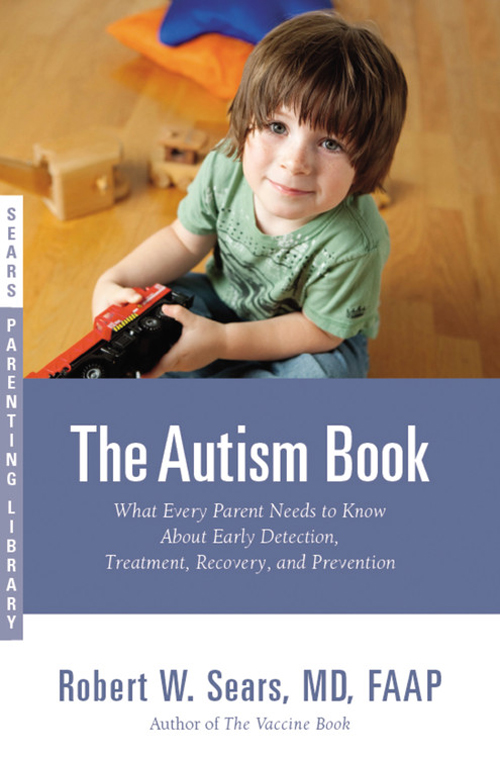Copyright 2010 by Robert W. Sears, MD
All rights reserved. Except as permitted under the U.S. Copyright Act of 1976, no part of this publication may be reproduced, distributed, or transmitted in any form or by any means, or stored in a database or retrieval system, without the prior written permission of the publisher.
Little, Brown and Company
Hachette Book Group
237 Park Avenue, New York, NY 10017
Visit our website at www.hachettebookgroup.com
www.twitter.com/littlebrown
First eBook Edition: April 2010
Little, Brown and Company is a division of Hachette Book Group, Inc.
The Little, Brown name and logo are trademarks of Hachette Book Group, Inc.
ISBN: 978-0-316-08896-1
ACCLAIM FOR DR. ROBERT W. SEARSS
The Autism Book
What Every Parent Needs to Know About Early Detection,
Treatment, Recovery, and Prevention
Autism has many facets, from behavioral to educational to medical, and parents working for the best possible future for their children need a lot of options. Dr. Sears covers the territory broadly, fairly, clearly, with suitable cautions, and in very useful detail.
Martha Herbert, MD, PhD, Pediatric Neurologist, Massachusetts General Hospital, Harvard Medical School
The Autism Book presents a clear, concise plan for the treatment of autism. Dr. Sears has covered a very complex topic and has done the groundwork for concerned parents and practitioners. He thoroughly discusses a myriad of topics, including the basics on vaccines, information on the diagnosis of autism, and therapies from routine medical and behavioral to the more complex biomedical. This is a must-read for anyone interested in the care of the child on the autism spectrum.
Stephanie F. Cave, MD, author of What Your Doctor May Not Tell You About Childrens Vaccinations
Dr. Bob Sears has written a gem of a book geared toward parents, but extremely useful for professionals as well. In parent-friendly language, he provides a road map for parents of a child with autism, as well as those who may be questioning whether their child is developing typically. The biomedical chapters are incredibly informative, and, together with the educational-therapeutic intervention chapter, they lead you down a path of empowerment through knowledge. As a neurodevelopmental pediatrician, I know I will be referring to the biomedical section often and encouraging every one of my families with a child with an autism spectrum diagnosis to buy this book!
Marilyn C. Agin, MD, FAAP, neurodevelopmental pediatrician and coauthor of The Late Talker: What to Do If Your Child Isnt Talking Yet
Dr. Sears has made another valuable addition to the Sears Parenting Library. The Autism Book is an easy-to-read, comprehensive, information-filled resource for parents of children with autism spectrum disorders.
Kenneth A. Bock, MD, coauthor of Healing the New Childhood Epidemics: Autism, ADHD, Asthma, and Allergies
Dr. Bob has done it again! The Autism Book is an important resource for both new and experienced parents of children with autism. Dr. Bobs balanced, integrative approach is a much needed fresh take on how we should confront the most troubling health epidemic of our times.
Lawrence D. Rosen, MD, FAAP, founder of The Whole Child Center, Oradell, NJ
This is a solid, accessible book by a wise pediatrician and teacher and, most important, a doctor who really practices the art of listening to his patients.
Sidney M. Baker, MD, coauthor of Autism: Effective Biomedical Treatments and cofounder of Defeat Autism Now!
Sears Parenting Library
The NDD Book
The Vaccine Book
The Healthiest Kid in the Neighborhood
The Baby Sleep Book
The Premature Baby Book
The Pregnancy Book
The Baby Book
The Birth Book
The Attachment Parenting Book
The Breastfeeding Book
The Fussy Baby Book
The Discipline Book
The Family Nutrition Book
The A.D.D. Book
The Successful Child
Parenting.com FAQ Books
The First Three Months
How to Get Your Baby to Sleep
Keeping Your Baby Healthy
Feeding the Picky Eater
Sears Childrens Library
Baby on the Way
What Baby Needs
Eat Healthy, Feel Great
You Can Go to the Potty
Also by Dr. Robert Sears
HappyBaby: The Organic Guide to Babys First 24 Months
For my dear wife,
Cheryl,
and our children,
Andrew
Alex
Joshua
For autism updates, links to resources, new research, new treatment ideas, conference announcements, and more, visit www.TheAutismBook.com.
For vaccine-related information and questions, visit www.TheVaccineBook.com.
Autism has become one of the most widespread childhood epidemics in recorded history. Except for some infectious disease epidemics of the past, no other serious condition has ever affected so many of our children. The latest research in Pediatrics reveals that autism affects a staggering 1 in 91 children (1 in 58 boys), with 673,000 currently affected. The CDCs latest study shows a rate of 1 in 110 kids (1 in 70 boys; see Resources, ). As five million babies are born every year, 50,000 new diagnoses will be made yearly. What makes it so devastating for parents is that autism can strike unexpectedly, seemingly out of nowhere; a healthy and neurologically normal infant can suddenly regress into autism between ages one and two. Some toddlers dont regress; they simply stop progressing through normal social and language milestones. Some infants appear to be born with autism, displaying some characteristics right from the start that eventually lead to a diagnosis.
We dont yet know what causes autism. There are many theories, but despite all the research currently under way, we are still far from answering this question. We do, however, know a great deal about how to treat autism and how to help children recover. That is what The Autism Book is all about.
If you are the parent of a child newly diagnosed with autism or if you have a child with borderline development who you worry may be at risk for autism, I will show you how you can best help your child minimize future developmental challenges. If you are a new parent with a healthy baby, I will show you what factors may possibly increase a babys risk of developing autism and tell you how you can best minimize these risks.
Early recognition and intervention are perhaps the most important aspects of successful autism treatment. Noticing some developmental delays but postponing treatment until a definitive diagnosis of autism is made does that child, and his family, a great disservice. In , I explain all the signs and symptoms of autism so you can suspect a diagnosis at the earliest possible age and begin early intervention.
Many developmental and behavioral therapy approaches have been proven effective in the majority of children with autism. These include speech and language therapy, occupational and sensory integration therapy, applied behavioral analysis therapy, social developmental therapy, and several others. I discuss these treatments in detail in and show you how to access them so you can begin your childs recovery. I also discuss certain psychiatric and behavioral medications that have been shown to decrease some symptoms of autism and improve behavior and learning.
A number of medical, nutritional, and vitamin-based treatments have been shown to not only improve symptoms but also address some of the possible underlying medical and biological causes of autism. Together, these treatments are called the









